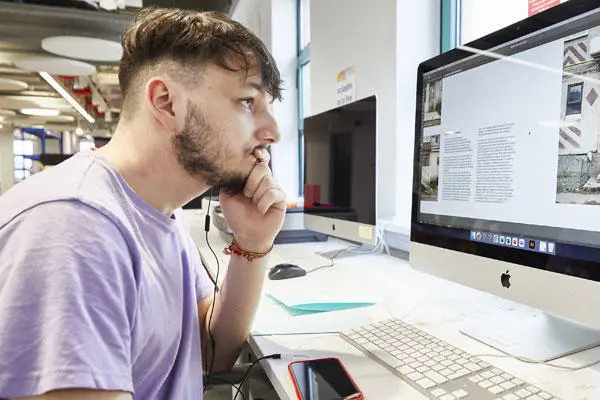
MSc Digital Marketing
This exciting, challenging, practice-orientated course will develop your strategic and creative skills, equipping you for a dynamic career in or related to the rapidly expanding digital marketing sector.
Find out more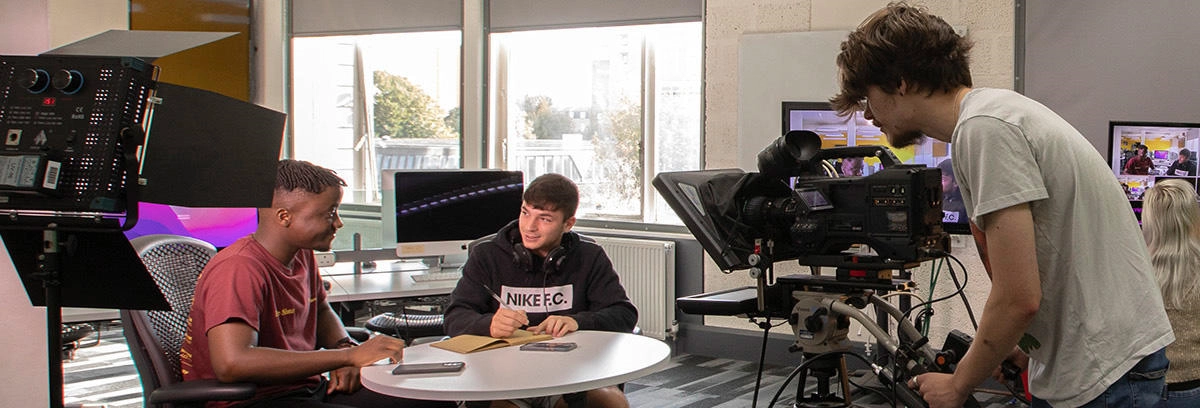
Turn ideas into content that connects. This course blends creative production with marketing and entrepreneurship, preparing you for success in the fast-growing content economy.
Contact international admissions
Email: Call:Success in the modern media landscape requires graduates to be flexible, adaptable, and multi-skilled - able to respond to technological innovation, shifting audience behaviours, and new business models. This course will equip you with the creative, strategic, and entrepreneurial skills needed to meet these requirements and thrive in the rapidly evolving and dynamic creative industries.
You will be introduced to core technical and storytelling skills across video production, photography, audio production and creative design alongside emerging technologies whilst recognising and exploring the creative synergies across and between these media. The course is designed to produce flexible storytellers who create ‘content that connects’ on an emotional level and who can tailor and target their bespoke and engaging media production to specialised contexts.
You will also be supported to develop complementary skills in content entrepreneurship, digital marketing and enterprise, reflecting the growing demand for graduates who are not only talented creatives, but who also understand how to build audiences and monetise content across the convergent media landscape.
From the start, you will be approached as if already working in the industry through simulated and live client briefs; collaborating with the fellow ‘creatives of tomorrow’ on parallel courses, gradually developing a work-ready portfolio of creative work and a network of creative contacts.
If you’re looking to study our creative media production degree but don’t have the relevant qualifications or experience, the foundation year in media will help you develop the core skills and knowledge to progress. Find out more about the foundation year in media.
This course also offers the option of a placement year. A placement year allows you to put what you've learned in your first and second years into practice in the workplace, gaining valuable real-world work experience before you graduate. Our course and placements teams will help you find the perfect industry placement in your chosen field.

This course is for aspiring content creators who don’t just want to make media, but also want to understand how to build audiences, market their work, and turn creativity into a business. It’s ideal for students who are curious, entrepreneurial, and ready to explore how content works in the real world - whether their goal is to launch their own content venture or to bring fresh ideas into the growing content industries.
Graduates of the programme will be prepared to work across a wide range of roles within the creative industries, including content production, digital marketing, social media strategy, podcasting, immersive media, and brand storytelling.
The University cannot guarantee any particular members of staff will teach specific aspects of the course in the future, but will endeavour to ensure the teaching team maintains their balance of experience and qualifications.
Creative media production students benefit from access to our full range of professional media facilities and learning resources. Media facilities include testing labs, production studios, portable devices and TV/radio broadcasting equipment. Film-making equipment includes high-definition (HD) video cameras and DSLR full-frame cameras with a wide range of top-quality lenses and lighting kits.
Students also have free access to our media loans service, offering cameras, lenses, tripods, lighting and sound equipment which can be booked as required. Students on this course have full access to the University’s multi-million-pound media academy which boasts industry-standard facilities including green screen studios, post-production suites, and a range of audio production facilities. The academy’s post-production facilities also feature Mac Pro computers and the full Adobe Creative Suite for editing, colour grading and special effects.
Broaden your horizons by adding an international dimension to your CV – essential to achieving success in today’s fast-changing, global environment.
Studying, working or volunteering in another country could be the experience of a lifetime. Enhance your degree by developing important global skills such as knowledge of other countries, language skills, intercultural awareness, adaptability and confidence.
For more information, please email international.mobility@solent.ac.uk.
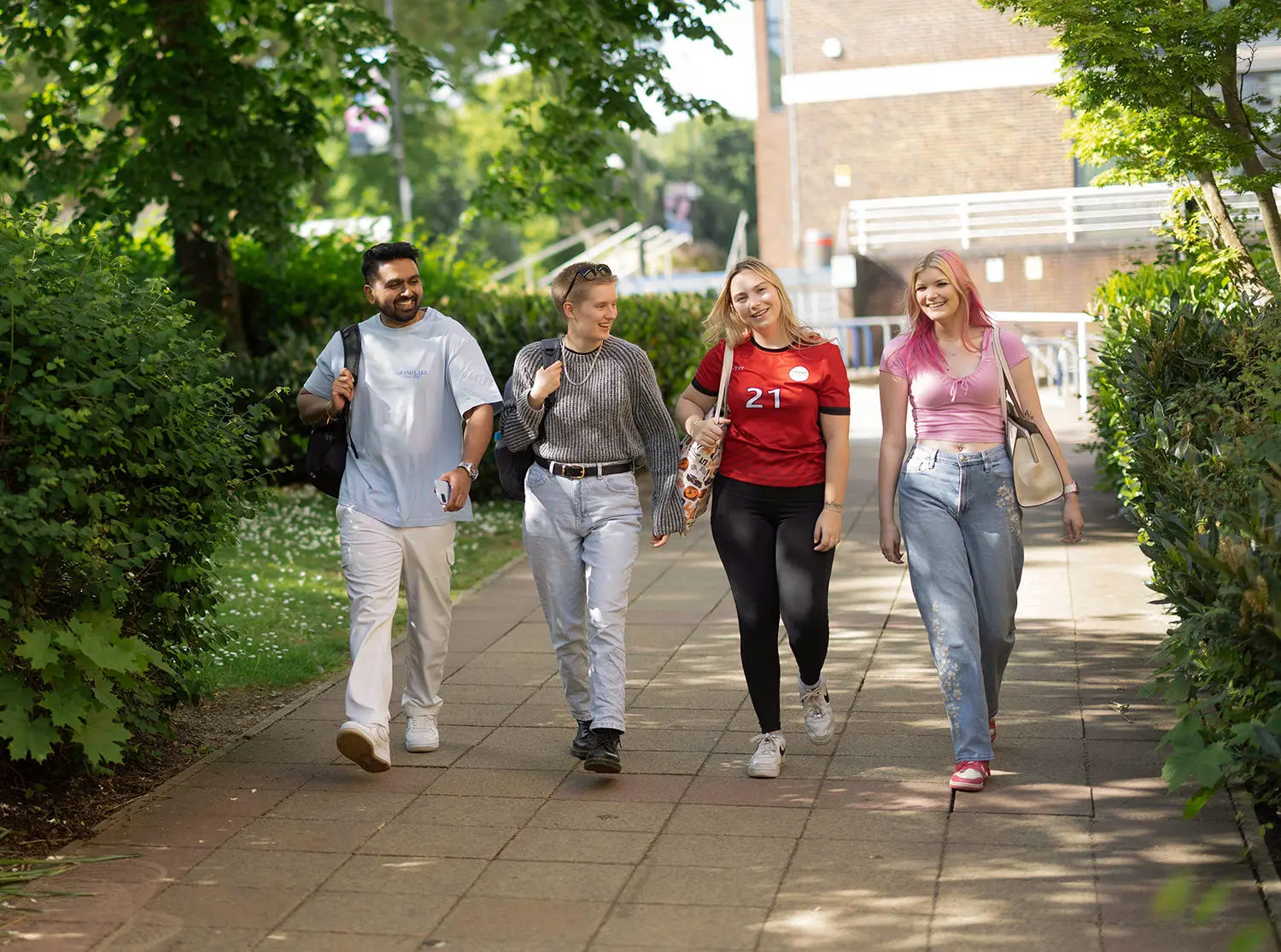
This module will help you acclimatise to the university experience and the city of Southampton. You'll explore the city through the integration of photography and audio, according to aspects of the city that help you feel like you ‘belong’, whilst thinking about the relationship between photography, audio design, the self and the city.
This module introduces you to the practical, creative and collaborative skills involved in the ideation, development, planning, and ultimate delivery of a short film. You'll explore key storytelling concepts, techniques and strategies that help you to maximise engagement with your final film. You'll take part in weekly, hands-on tasks and exercises that contribute to the final assessment and that help you understand creativity as a rolling, iterative practice.
In this module, you'll collaborate with students on other creative foundation years. You'll begin to explore the professional world of creative practice via an introduction to the soft and hard skills that cut across the creative industries, by investigating future pathways and opportunities, and by kickstarting a personal narrative about your own role in the creative industries sector.
As the final module on the foundation programme, this module showcases the diversity of creative skills represented across the creative foundation courses and gathers these skills together in the end-of-year showcase. You will use your specific skillset to contribute to this overall project - cross-disciplinary collaboration is encouraged. The showcase is your opportunity to share your project with key partners and celebrate your contributions with their fellow creative foundation students.
This module explores the growing importance of branded storytelling in a digital-first world, addressing real-world challenges such as creating authentic narratives, connecting brands to audiences, and delivering compelling and integrated visual and written content across relevant platforms.
This module explores audio storytelling as a powerful medium for engaging with contemporary social issues, challenging dominant narratives and amplifying marginalised voices.
The module aims to introduce students to engaging professionally, collaboratively and collegiately with clients. Where appropriate and practical, a range of clients will be introduced allowing for a richer experience and the ability to demonstrate flexibility and strategic differentiation.
In this module, you'll develop your ability to function as a media or marketing consultant by applying journalistic and or content creation principles to real-world commercial and community challenges. You'll evaluate a local client’s business or organisational need and existing media performance, using this analysis to design and propose an innovative, platform-native content strategy.
This module will teach key storytelling skills in the context of producing an engaging and professionally formatted script for their final production. The module then communicates key video and audio production strategies in terms of bringing their script to life and creating appropriately designed and choreographed cine-scapes and / or sound-scapes.
This module examines the essential role of digital communities and data-informed strategy in contemporary media, communications, and content creation. Groups will take ownership of the social media channels for the course's brand, Carbon, developing targeted, evidence-based campaigns and marketing plans, using real-world data to track, iterate, and refine their approach.
This module brings storytelling together with audience and platform understanding to enable you to build your discipline-specific knowledge and practice by devising your own original audio or audio-visual series for a specific platform of your choosing.
The module will problematise the naturalness of ‘authenticity’ and consider how it is constructed through cultural and communication practices and ultimately our own creative media production through strategies such as address, themes, aesthetics, narration, and storytelling.
This module enables you to critically evaluate the current trajectory of technological innovation within news journalism and media, including the legal and ethical implications of advanced technologies like AI and algorithms, preparing you to lead change by generating and presenting informed, ethical, and creative solutions for the evolving global media environment.
In this module you'll critically evaluate your personal strengths and professional capabilities through direct industry exposure (placements) and real-time research, leading to a deeper understanding of specific career requirements. You'll use structured reflection in action to identify skill gaps and opportunities and create a personal development plan (PDP) and portfolio in progress that charts your transition to employment.
On the module, you have creative freedom to negotiate and define your own creative media project and then shape and deliver the project. We welcome submissions in audio, video, photography alongside imaginative combinations of the above or innovative submissions in emerging media where practical and appropriate.
Please note: Not all optional modules are guaranteed to run each year.
The module enables you to master the strategic and collaborative process of event management by designing and executing an engaging live (IRL) event. You'll learn to critically reflect on the four stages of event planning and the complexity of event roles, providing an in-depth analysis of the future viability of IRL events in their professional sector.
This practice-led module is the culminating experience to prepare you for transition into the creative industries. By bridging academic learning with industry realities, you'll create a specialised, industry-ready portfolio of work that showcases advanced technical execution, ethical responsibility, and a critical understanding of future employment or business launch potential.
Through practical, project-based learning, you will develop skills in digital garment creation, virtual prototyping and 3D visual communication. Alongside technical development, you explore emerging technologies to understand how digital tools support sustainability, efficiency, and innovation across fashion and marketing.
Contact international admissions
Email: Call:As part of this course, you will study one module at a time, giving you the chance to build a deeper understanding and see the results of your hard work more quickly. With regular assessments and feedback, rather than exams all at once, you’ll also benefit from improved focus, and a more manageable workload.
Learn more about block teaching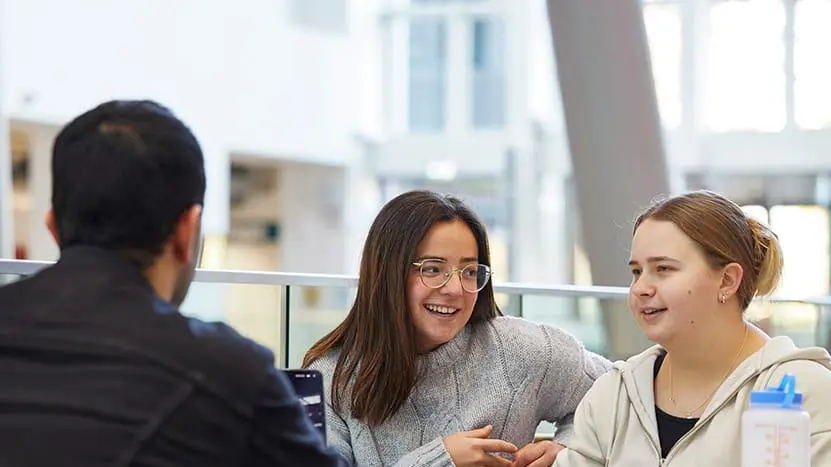
The student achievement team are on hand to help you succeed during your studies at Solent. They aim to contact you at key times during your time here with personalised information, advice and guidance, by email or phone.
The disability advice team provides information, advice and guidance for disabled students.
All students can access Succeed@Solent, Solent's online guide to getting better grades. It offers extensive, practical information and advice on topics such as academic writing, research and presentations.
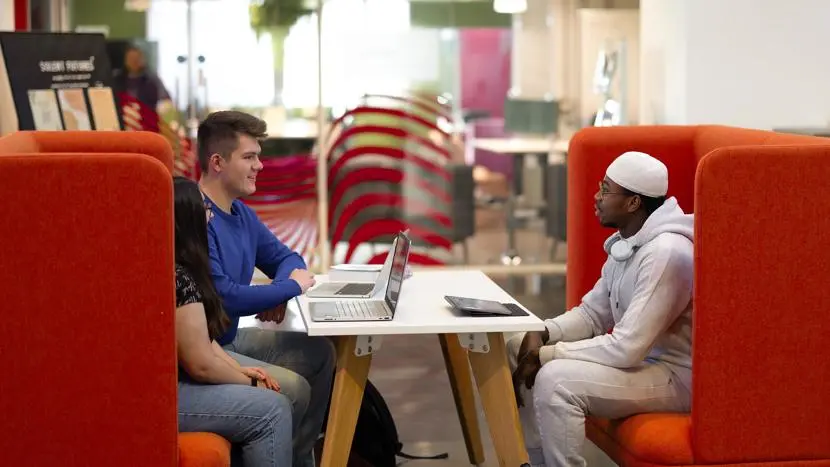
The content industries are among the fastest-growing parts of the global economy, spanning everything from independent creators and start-ups to established media and marketing companies. Demand for original, engaging content continues to rise as audiences consume stories across platforms, making skilled content producers and strategists highly sought after.

Starting salary: £22,000 to £25,000
As a digital marketing officer or executive, with a few years' experience, you can expect to earn in the region of £22,000 to £28,000. In a more senior management role, such as digital marketing manager, you could earn up to £48,000.
Starting salary £20,000 to £28,000
Starting salary is for a social media assistant. Social media managers typically earn between £25,000 and £45,000. With substantial experience, in roles such as head of social media, your salaries can range from £50,000 to in excess of £60,000.
Starting salary £22,000 to £30,000
Midweight copywriters with three or more years' experience can expect to earn £25,000 to £40,000 per year. For senior copywriters and heads of copy, the salary figure is between £45,000 and £80,000.
The stated salaries are published on prospects.ac.uk. Income figures are intended as a guide only.
The Solent Careers team is committed to getting students into great careers.
While you are studying, the team can help you with finding work experience or placements, link you with a mentor, check your CV, or offer one-to-one guidance.
We also have graduate job opportunities just for Solent graduates.

6th
UK uni for sustained employment
Longitudinal Educational Outcomes, 2022
Every student at Solent University will also have the option to study an additional Certificate in Practical Artificial Intelligence qualification alongside their course. Free of charge, the course ensures you'll be prepared for a fantastic and varied career after graduation.

Thinking about studying further than an undergraduate degree? Alumni can get 20% off their postgraduate study.

This exciting, challenging, practice-orientated course will develop your strategic and creative skills, equipping you for a dynamic career in or related to the rapidly expanding digital marketing sector.
Find out more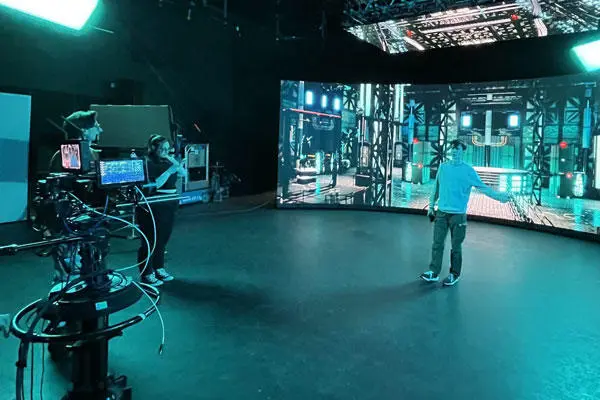
Explore, experiment and learn the industry skills to become a trailblazer in virtual production (VP) and extended reality (XR) using Solent's VP volume, XR green screen studio, Vicon mocap, and body scanner.
Find out more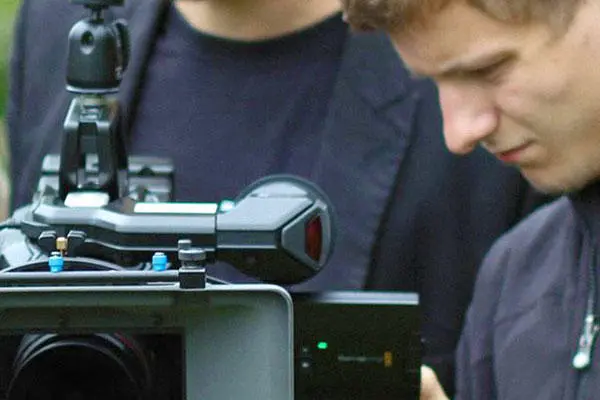
Got a passion for filmmaking? Want to improve your professional showreel and boost your employability? Solent’s MA Film Production programme is ideally suited to students who...
Find out moreThe tuition fees for the 2026/27 academic year are:
For further information, please visit our tuition fees page.
While most course costs are covered by your tuition fees, some essential resources and optional extras may need to be paid for separately. These additional costs are listed below. For advice on budgeting and managing your money, please contact student.funding@solent.ac.uk.
Solent University offers a range of bursaries and scholarships that provide financial assistance or waive fees for tuition or accommodation. Each bursary or scholarship has specific eligibility criteria. Check out our bursaries and scholarships pages to find out more.
Cost of living support
At Solent, we understand that the cost of living crisis may be of some concern. To help, we've put together some detailed information to show what support is available and how to make your money go further.
Graduation costs
There is no charge to attend graduation, but you will be required to pay for the rental of your academic gown (approximately £45 per graduate, depending on your award). You may also wish to purchase official photography packages, which range in price from £15 to £200+. Graduation is not compulsory, so if you prefer to have your award sent to you, there is no cost. Extra guest tickets will go on sale after results publication and will be sold on a first-come-first-served basis. The cost per ticket is currently £20. Please note, we do not guarantee there will be any extra tickets available to purchase.
Contact international admissions
Email: Call:Please select an option below:
As a general guide, we look for qualifications that are equivalent to the British high school A-levels.
If you are applying from outside the UK, find information about entry requirements, visas and agents for your country here.
For further information about EU qualifications, please see our course entry requirements document.
For international students who do not meet the direct entry requirements for this undergraduate degree, our trusted partner, QA Higher Education offers the following pathway programme designed to develop your academic and English language skills:
As a general guide, we look for qualifications that are equivalent to the British high school A-levels.
If you are applying from outside the UK, find information about entry requirements, visas and agents for your country here.
For further information about international qualifications, please see our course entry requirements document.
For international students who do not meet the direct entry requirements for this undergraduate degree, our trusted partner, QA Higher Education offers the following pathway programme designed to develop your academic and English language skills:
All international applicants need to be aware that the English language requirements to attend Solent University, and the English language requirements to obtain a visa from the Home Office, may be different. This means that if you meet the Solent University language requirement to gain a place on the course, you may still have to meet additional requirements to be granted with a visa by the Home Office.
We strongly advise all applicants to visit the Home Office website which outlines all the requirements for a successful visa application.
Full-time
Any student applying for the first year of a full-time/sandwich undergraduate course must apply through UCAS (University and Colleges Admissions Service). This includes mature, overseas and EU students.
Nearly all schools and colleges offer their students the facility of applying electronically through the UCAS website using 'Apply'; it may also be used by those applying independently in the UK and overseas. This facility and all course information can be found on the UCAS website: www.ucas.com.
Your application should reach UCAS by 14 January if you hope to enter a course the following autumn. Early application is advised for the most popular subject areas. Late applications may be made until the end of June. The UCAS Code for the University is S30, code name SOLNT.
Find out what happens after you apply
Contextual offers
Solent endeavours to offer learning opportunities to students from all backgrounds. When we receive and review an application, we take into consideration the context and personal circumstances of applicants when making a decision, which means our advertised entry tariff could be reduced.
Find out more about Solent's contextual offers
Applicants who do not have English as their first language will be required to demonstrate an approved level of proficiency in the use of the English language. The agreed minimum requirements for this course are:
TOEFL IBT tests taken prior to 21 January 2026
TOEFL IBT tests taken from 21 January 2026
Qualifications are checked before enrolment, and international students must bring their original certificates or certified copies when coming to study at the University.
Pre-Sessional English programme
The University also offers a pre-sessional English programme for international students who wish to improve their level of English before starting a degree course.
Contact international admissions
Email: Call: